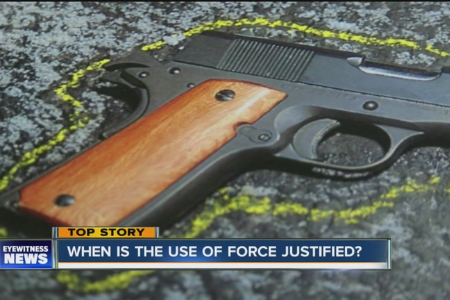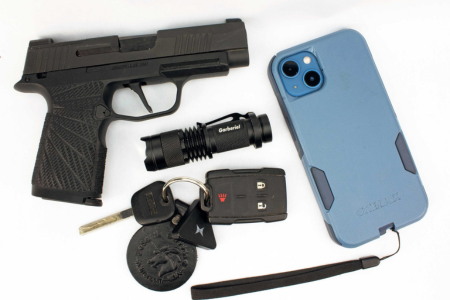According to the Texas law firm of Armed Attorneys, here are the five most common self-defense scenarios they have seen, either in a previous life as prosecutors, or now, as defense attorneys.

5. Breaking Up A Fight
It may start out as a use of force or low level of non-lethal force incident and quickly escalates into a deadly force incident, if one or both of the combatants pulls out a knife, a gun or some other instrument which can be considered deadly force. The person intervening may not know all the circumstances as to why the combatants are belligerent with each other. Often people who insert themselves into the scenario to break it up often do not know who the initial aggressor is and who the “victim” is. But keep in mind that 3rd party defense is not legal in every state.

4. Breaking Up A Bar Fight
Everyone is drinking, Some may be intoxicated. Guilt or innocence will not be based on the amount of alcohol in one’s system but based on an ordinary prudent man. Keep in mind that if you are truly the “victim” and use an excessive amount of force to defend yourself, you may be arrested for some level of assault. Juries don’t like it when people heighten emotions or tension, aka heightening the incident. To avoid this, don’t become intoxicated. Be cognizant of not provoking an incident. Don’t let your pride take over.
3. Neighbor Disputes

This comes up in many different forms; a neighbor who does not respect a property boundary, or a neighbor who has dogs who is destroying property, such as destroying or tunnelling under fences, and killing livestock. The biggest pitfall with these disputes is that the police may not know or won’t be privy to the leadup history between neighbors which escalated over time. The police will look at that snapshot of time at that moment of occurrence. Law enforcement hates responding to neighbor disputes. If they get called out due to a use of force 911 call, they will undoubtedly arrest one of the neighbors, perhaps both. They do not want to hear the entire backstory. Keep in mind that if you get arrested, the problem doesn’t go away. You still have to live next to that neighbor and that neighbor still hates your guts. The neighbor who did not get arrested may call the prosecutor’s office and demand maximum punishment for the accused, simply because the non-arrested neighbor has to see the one who got arrested every day.
2. Dog Attacks

Much of the time, the culmination of past history with bad dogs is when one neighbor simply shoots the attacking dog, not necessarily based on what that dog is doing at that moment in time. Let’s suppose a few weeks ago, an aggressive dog attacked and killed your small dog. Then today you see the aggressive dog in his own yard not being aggressive, and you simply shoot it. When police arrive, they don’t want to hear “that dog killed my dog three weeks ago.” Instead, the police will ask “what was that dog doing today?” Keep in mind that if the aggressive dog is on your property, merely trespassing on your property does not give you the legal right to use deadly force. Another scenario of this type is where you are walking your leashed dogs in your neighborhood or on a trail. There is a rise in loose-running, unsupervised aggressive dogs lately. Should this be the case, you may want to think of using a defensive tool that is not lethal, because if all you have on you is a hammer, everything looks like a nail. Carry a non-lethal tool for defense. And the reason is that shooting the aggressive dog may get you arrested. It may not be for cruelty to animals, but rather your city or town may have an ordinance against discharging a firearm inside city limits.
1. Road Rage

Even if you are minding your own business and think you are the good guy and will just set your handgun on the dashboard to scare the road rage aggressor, doing so during a road rage incident will get you arrested. In Pennsylvania, while there is no brandishing law, there is a terroristic threats law, and simply setting your handgun on the dashboard may construe a silent terroristic threat. Road rage incidences are a “he said, she said” type of incident, so as soon as you display your handgun, the aggressive driver is calling the police to report your bad driving with a gun, not their own bad driving. Even if you don’t point the gun. The other aggressive driver will always report that you pointed the gun. If you carry in your vehicle, make every attempt to de-escalate the situation and avoid road rage, because if the other driver told the police, you pointed a gun at them, and the police find a gun in your vehicle, you will be arrested. Do not pull out your gun unless it is absolutely the last resort. If the other person exist their vehicle and comes at you with a tire iron or a gun, you have every right to defend yourself with your firearm, but don’t pull out your firearm until the scenario escalates. One of the things the police, prosecutors and jury will look for is “could you have avoided or de-escalated the situation by simply driving away?” Even in Pennsylvania, which is a “Stand Your Ground” state and you have every legal right to stay put, juries just can’t help themselves. They will ask each other in the jury room, “why didn’t the victim simply drive away?”



